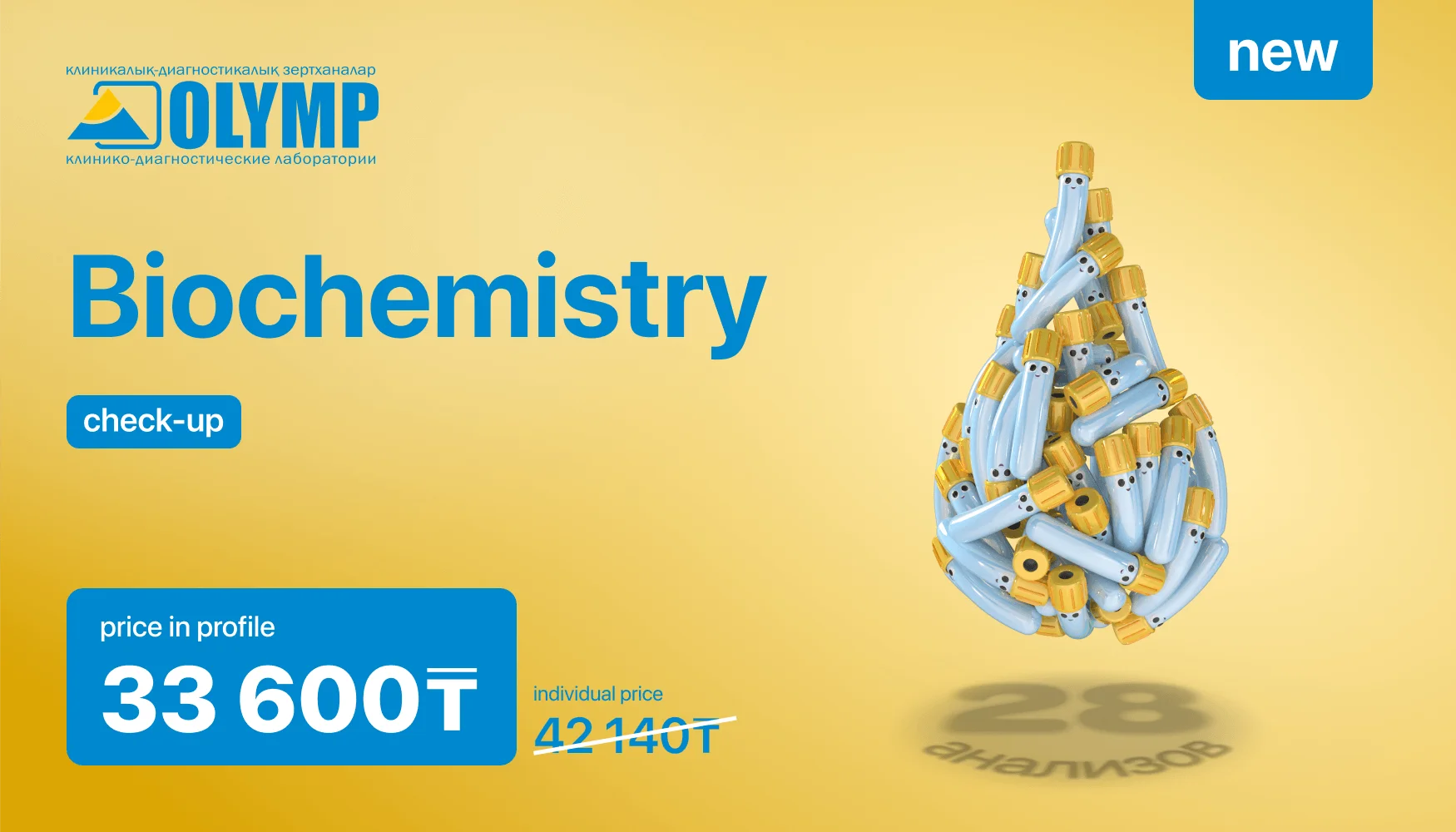
New! "Biochemistry" Checkup
Complex analysis of 28 biochemical blood tests
Separate price:42 140 tg.
Price in profile:33 600 tg.
The checkup includes 28 tests:
- Ferritin
- Magnesium (Mg)
- Iron (Fe)
- Potassium
- Sodium
- Chlorine
- Inorganic phosphorus
- Total Calcium
- Triglycerides
- Total cholesterol
- HDL cholesterol
- LDL cholesterol
- Alanine aminotransferase (ALT)
- Aspartateaminotransferase (AST)
- Gammaglutamyltransferase (GGTF)
- Bilirubin total
- Bilirubin direct
- Alkaline phosphatase
- Glucose
- Glycosylated hemoglobin
- Pancreatic alpha-amylase
- Lactate dehydrogenase (LDH)
- Total protein
- C-reactive protein
- Rheumatoid factor
- Urea
- Uric acid
- Creatinine
Ferritin is a major iron-containing protein that helps assess the body's iron stores.
Magnesium (Mg) - is a component of teeth and bones. Magnesium deficiency (hypomagnesemia) leads to serious health problems.
Iron (Fe) is an important element necessary for the formation of hemoglobin and the transportation of oxygen.
Potassium is an electrolyte necessary for normal muscle and nerve function.
Sodium is an important electrolyte that maintains water and acid-base balance.
Chlorine is an electrolyte that plays a key role in maintaining the body's water balance
Inorganic phosphorus is an important element for bone and tooth formation and energy metabolism.
Total Calcium is mineral essential for bone health, muscle and nerve function.
Triglycerides are fats found in the blood, the level of which is important to control to prevent cardiovascular disease.
Total cholesterol is a lipid necessary for the formation of cell membranes and hormone synthesis.
HDL cholesterol is "good" cholesterol that helps remove excess cholesterol from the blood.
LDL cholesterol is "bad" cholesterol that can build up in the arteries and cause atherosclerosis.
Alanine aminotransferase (ALT) is enzyme whose elevated levels may indicate liver damage.
Aspartate aminotransferase (AST) is enzyme whose levels may be elevated in heart or liver damage.
Gammaglutamyltransferase (GGTF) is enzyme whose levels may indicate liver or biliary tract disease.
Total/direct bilirubin is a pigment formed by the breakdown of hemoglobin, elevated levels of which may indicate liver problems.
Alkaline phosphatase is an enzyme associated with liver, biliary tract and bone function.
Glucose is the body's main source of energy, controlling levels is important for diagnosing and monitoring diabetes.
Glycosylated hemoglobin is an indicator of the average blood glucose level over the last 2-3 months.
Pancreatic alpha-amylase is an enzyme associated with the function of the pancreas.Increased concentration occurs against the background of inflammatory processes or impaired outflow of pancreatic juice.
Lactate dehydrogenase (LDH) is a zinc-containing intracellular enzyme that is involved in the conversion of lactic acid into pyruvate. It is present in almost all cells of the body, but is most active in skeletal muscle, heart muscle, kidney, liver, and red blood cells.
Total protein is an indicator that is important for assessing overall health
C-reactive protein is a marker of inflammation, elevated levels may indicate the presence of inflammation.
Rheumatoid factor is a marker associated with autoimmune diseases.
Urea is an indicator of kidney function and the state of protein metabolism.
Uric acid is a breakdown product of purines; elevated levels may indicate gout or kidney problems.
Creatinine is an indicator of kidney function.
It is more profitable to undergo tests in profile and checkup than separately